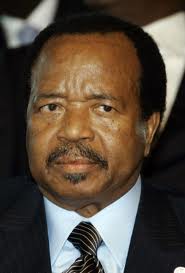2011-02-15 Cameroon's rumoured protests
 Despite all search engines showing nothing but football for news in Cameroon, Twitter insists they are having a revolution, beginning with protests on February 23. The hashtags are being used, but there is very little under them. The Cameroon Tribune reports “Thousands of youths last Thursday, February 10 marched in the streets of Yaounde to demonstrate their patriotism and commitment to preserve peace, stability and development in Cameroon. The march in support of President Paul Biya and the institution he incarnates was in reaction to the wind of violence and destabilisation of State institutions blowing across some African countries.”
Despite all search engines showing nothing but football for news in Cameroon, Twitter insists they are having a revolution, beginning with protests on February 23. The hashtags are being used, but there is very little under them. The Cameroon Tribune reports “Thousands of youths last Thursday, February 10 marched in the streets of Yaounde to demonstrate their patriotism and commitment to preserve peace, stability and development in Cameroon. The march in support of President Paul Biya and the institution he incarnates was in reaction to the wind of violence and destabilisation of State institutions blowing across some African countries.”
There are three pictures circulating online that say they depict “Youngsters from Cameroon protest against the government and the president Biya, willing to stay in power by changing the Constitution. The crowd was also protesting against the unemployment and the inflation. They burnt public building, cars, and even a bus.” But the pictures are from the February 2008 riots which killed between 40 and 139 people. Those riots broke out when 78 year old Biya , who has been president for 29 years, brought in a constitutional change that did away with presidential term limits and enabled him to run again. There is another presidential election due in October, but Cameroon’s elections, always regarded as some of the most corrupt in the world, received a new blow in March 2010 when parliament passed a bill giving the government oversight of poll preparations, supplanting the previous independent electoral body.
"This law is the worst law we've ever had because it brings back the administration and members of the judiciary into the electoral process in full force," said Afany Ngeh, executive president of the Foundation for Human Rights and Development. "These are two very corrupt groups in this country that have paralysed elections in the past."
Cameroonian Presidential candidate and women's rights activist Kah Walla has warned Cameroon President Paul Biya that protests could come to Cameroon in an open letter on February 12. "It is a very bad season for presidents who have been in power for over 20 years, maintaining their power through dubious, ritualistic elections, which have credibility neither with their own people nor with the global community," she wrote.
According to US state cable 09YAOUNDE369 from 2009, “Cameroon's ability to track its own budget is among the worst in Africa. ... The Embassy believes there is significant variance between the projected budget and the budget as it is actually executed. Embassy contacts tell us that the GRC does not have the capacity to track its own budget execution because there is no interface among various computer programs used by the Office of the Budget (which plans the budget) and the Office of the Treasury (which spends the money), meaning even the Minister of Finance is incapable of giving a detailed account for how funds were spent. Additionally, numerous civil society organizations have reported difficulty in obtaining detailed expenditure information for their efforts to track budget execution in certain localities or in certain sectors. For many years, the GRC was engaging in off-budget spending, including especially use of oil revenues to finance security and defense projects. This practice was increasingly reduced during the GRC's participation in the IMF program, but recent reports indicate the GRC is again spending substantial sums "off-budget."
Amnesty international describes Cameroon as routinely using killings and torture to repress political dissent,and says of the victims of the 2008 riot killings, “Amnesty International has received photographs and testimonies suggesting that some of the victims were shot at point blank range, without any effort made to arrest them.”